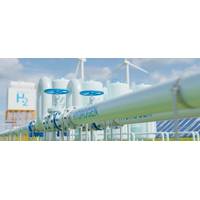Guangdong Carbon Scheme Sparks China Green Vs Growth Dispute
China's campaign against pollution and greenhouse gases is hitting early resistance in Guangdong province, where more than 60 manufacturers are holding back from a carbon market launched last year, saying the scheme is unfair and too costly.
The stand-off between a quarter of the intended participants in the emissions market and the provincial government underlines the difficulty in implementing green policies in China, even after the launch of a national "war against pollution".
China, the world's biggest emitter of climate-changing gases, has in the past year set up pilot carbon markets in six cities and provinces. It plans to roll out a nationwide scheme by 2020 that would make it home to the world's top carbon market ahead of current leader, the European Union, where carbon trades last year were worth about 36 billion euros ($50 billion).
But setbacks like the one now underway in Guangdong are likely to become more common as China turns from its "growth at all costs" model and seeks greater control over its dirtiest industries, with companies squeezed by a slowing economy pushing back against rising pollution and emissions costs.
"There is no reason for companies to pay millions of yuan a year (for carbon permits) when environment and energy regulators already charge us other pollution fees," said an official at provincial government-owned iron and steel producer SGIS Songshan, which has not bought any carbon permits.
The official, who wanted to remain anonymous because he was not authorized to speak to media, said pollution costs were already weighing heavily on the company as it must also pay fees for sulphur dioxide emissions, waste water and solid waste, and adhere to strict efficiency standards.
Despite strong backing from Beijing, Guangdong has limited power to force SGIS or other hold-outs - mostly cement and steel makers - to participate in its carbon market. It can hit them with a fine of 50,000 yuan ($8,000) per company and a possible reduction in the number of permits allocated to them next year.
That's measured, though, against an aggregate 42 million yuan the companies need to spend for access to carbon permits with a market value of 1.4 billion yuan.
LAST CHANCE AUCTION
In Guangdong, the local government hands out for free 97 percent of the permits that companies are expected to need to cover their emissions. To access the permits, they must buy the other 3 percent in auctions at a minimum price of 60 yuan each.
Yet, when the last planned auction for the 2013 compliance year ended a week ago, data from the China Emissions Exchange in Guangzhou showed that 64 of the 242 companies covered by the scheme still had not bought any carbon permits.
"Some of the companies don't have the money to pay for the permits. They are unlikely to change their mind and will not engage even if there are more permit auctions," said a consultant with several steel mills holding back from the Guangdong market among his clients.
Some of the province-owned companies have asked for more free permits or removal of the obligation to buy 3 percent in auctions, said the consultant, who wished to remain anonymous.
"They are waiting to see if the authorities will give in."
The mostly small- and medium-sized companies that are holding back have until June 20 to hand over permits to the government to cover their 2013 emissions - but their last chance to meet the 3 percent prerequisite and free up the rest of their permits may have ended with the auction on May 5.
"We have noticed the companies' concern and are discussing how to handle it," said an official with the Guangdong government's carbon trading department who wished to remain anonymous.
The government may arrange an extra auction in order to give companies another opportunity to buy permits and is also looking at ways to use auction revenue to help the firms cut emissions, the official said.
Other industry sources have said Guangdong has also asked some city governments to pressure companies to participate in the scheme.
RISING COSTS
The pollution of China's air, soil and water has sparked anger at home - poor air quality causes half a million premature deaths a year - while ever-rising carbon emissions has brought international pressure on Beijing to clean up its act.
The central government's war on pollution, however, along with overcapacity and tougher credit lines, is causing a major headache for manufacturers, many already facing huge losses.
The government's tendency to impose rules that are stricter in some regions than in others has also added to concerns.
Li Xinchuang, vice-secretary general of the China Iron and Steel Association (CISA), recently told a conference some regions face environmental costs twice as high as other areas.
Only one of China's other six pilot markets, in Hubei province, auctions a share of the permits, but there is no minimum requirement and the minimum price is set at 20 yuan.
The remaining four pilot schemes - in Beijing, Shanghai, Shenzhen and Tianjin - issue carbon permits for free, while in the rest of China, companies do not now face any carbon costs.
The country's large- and medium-sized steel mills lost 2.3 billion yuan in the first quarter of 2014, according to CISA, at least in part due to rising pollution costs.
"Now, air quality is so bad and the central government is determined to make improvements, so they do not care whether steel mills are happy or unhappy," saidXu Zhongbo, head of Beijing Metal Consulting, who works with steel mills on technology issues.
SGIS Songshan, one of the holdouts in Guangdong, increased steel production by 12 percent last year, and iron production by 11 percent, but still saw its revenue drop as China's economic slowdown hurt sales.
The company plans to boost production again this year, a move that would increase its carbon emissions and force it to buy even more permits if it is to comply with Guangdong's emissions trading scheme. ($1 = 6.2280 Chinese yuan) ($1 = 0.7269 euros) (Additional reporting by David Stanway)






